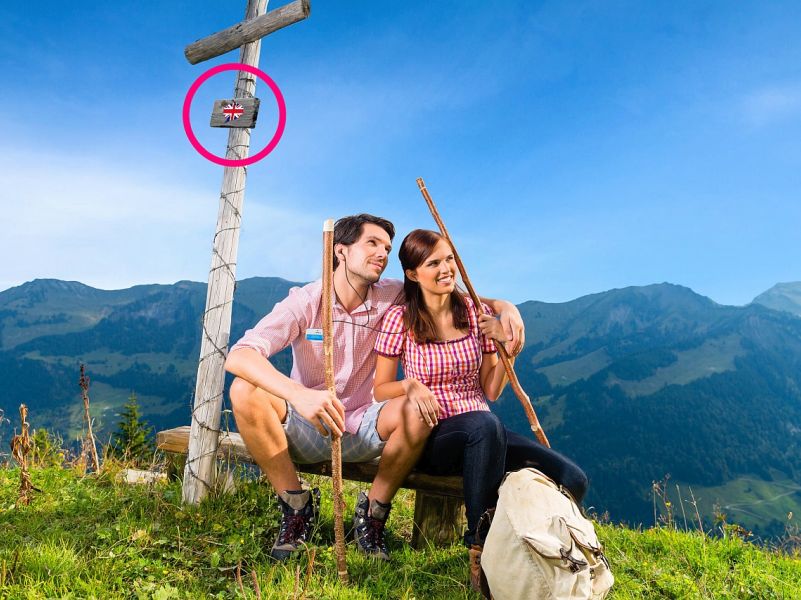Audio information is more popular than ever.
Being able to listen to information instead of having to read it is simply super convenient. But audio information is not only beneficial for the recipients, but also for the provider of the information:
Retrieving information by reading is increasingly falling behind audio and video.
People do not have the time or patience to read long pieces of information in small print.
In addition, reading is particularly difficult for people with visual impairments, reading difficulties or language deficits; indeed, it is often impossible.
Whether it’s information on the use of medicines, food labels, safety instructions or information boards in public spaces, the same applies to all of them: if you can’t read them, you don’t have access to this information.
Did you know that for almost 50% of the EU population, access to written information is difficult? More…
So with audio information, your messages will achieve much more reach!
The days when accessibility was solely about physical barriers are over.
Because barrier-free information access for people with visual and hearing impairments or cognitive limitations is just as much a part of the relevant legislation as ramps and wheelchair-accessible toilets.
According to the EAA (European Accessibility Act), apps, websites, smartphones and tablets must be designed in such a way, that they can also be used by blind people. So-called “screen readers” and voice assistants should enable navigation and read out the respective content.
Offline, however, information is still mostly offered only in written form. Here, the 2-senses principle with additional audio information would be an inclusive and barrier-free solution.

Additional audio information – just comfort for some, accessibility for others.
Sustainability and a conscious use of resources is the order of the day.
This raises questions such as:
Are image folders and separate brochures really necessary for every offer?
How much of it ends up in the trash because the content is outdated or the return transport from the trade show is too costly?
Or are thrown away unread by customers?
Information transmitted from an NFC tag to a smartphone is much more sustainable.
Small, robust and updatable, a single small NFC tag can deliver audio information to any number of people. At the trade fair, on the theme trail, in the museum or in the nature park.
The important thing is that no internet connection is needed to retrieve the audio information, because online data transmission takes quite a bit of energy.
That’s why direct data transmission via NFC is much more sustainable!
Audio information is ideal for culture and nature mediation.
Thanks to voice assistants, the cost and effort for audio files has decreased extremely. This allows completely new applications of audio information:
Tourism teams can offer their guests real “storytelling“.
History and stories, tradition and customs, natural beauty, flora and fauna….there is so much to tell. About destinations and their people, but also about regional products.
Audio information that is accessible 24/7 and works without internet, electricity or extra devices is a great, innovative offer, especially for young people. Free, fast and convenient “info-to-go”.
However, guests are not only happy about the exciting info, but also that their hands and eyes remain free. So mountain bikers, Nordic walkers and hikers can also enjoy the audio information. Without having to stop and read.

Audio Information offline at the mountain top – a great and sustainable service.
Easier, faster and much cheaper than you think!
When you think of audio, you usually think of recording studios with professional, expensive equipment. Trained speakers with high hourly fees. A lot of effort and correspondingly high costs. In other words, something that rarely is affordable.
This is why, for example, only a few large museums offer audio guides, even though they are very popular with visitors.
Software that creates audio files with voice assistants costs only a fraction, of course, and can be used online by anyone without much prior knowledge.
Find out how SpeechCode works: 5 steps to your personal SpeechCode - try it now!
read moreTo accommodate the varying needs of different use cases, SpeechCode offers several code and media options to best fit…
read moreFind out, why voice assistants can improve the reach of your messages and the comfort of the recipients.
read moreWhy Storytelling with Voice Assistants is a perfect combination
read moreHow to reach people with reading difficulties:
read moreFind out why there is a big difference between texts for reading or for listening to
read moreFor many cultural institutions audio guides are simply too expensive. Find out about affordable solutions
read moreCommunicating nature with interactive activities
read moreHow print media gain more reach with accessiblity
read moreZeroCon23 - THE event for the accessibility topic
read moreHow climate-friendly is the internet?
read moreAudible manuals have many advantages over printed editions
read moreWhy Universal Design instead of special solutions is the right approach for inclusion
read more